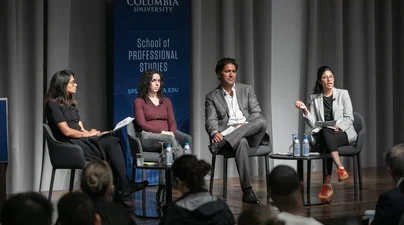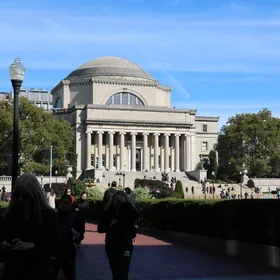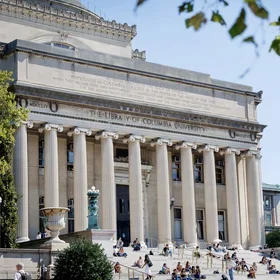“The question is not if AI will shape the future—I think that’s clear. The question is how.”
That’s how Jag Gill, moderator of the “Sustainability in the Age of AI & Driving Tech Solutions” event on March 31, described the increasingly important role of artificial intelligence in our world. The event, a collaboration among the Columbia University School of Professional Studies (SPS) Sustainability Management, Sustainability Science, and Technology Management programs, featured a panel discussion with prominent leaders from the sustainable technology field.
As the next groundbreaking tool for innovation, AI holds immense promise for tackling global environmental challenges. However, its potential for harm is equally significant. Panelists stressed the critical need for immediate cross-sector collaboration and robust ethical frameworks to ensure AI serves humanity, not the other way around.
The Risks and Challenges of AI
Panelists discussed the transformative power of technological innovation and how the topic of climate change has begun to seep into every aspect of our world. They began their discussion by highlighting some of the greatest risks associated with emerging technologies like AI.
“For some reason, tech and innovation are stuck in a highly polarized cultural conversation that stands in the way of real progress,” said Raj Pannu, CEO and founder of Emergence Creative. The use of technology to sell cultural ideology undermines efforts to build a sustainable urban future, he explained, particularly as institutions falter on past environmental pledges. Nimita Uberoi, strategy consultant at Giraffe Financial, pointed to examples like the Trump administration’s withdrawal from climate accords and the opaque sustainability practices of AI companies, illustrating a disturbing pattern of diluted progress.
“Another key concern when developing technologies is that they truly serve everyone,” Pannu added. “Oftentimes, the more advanced technologies become, the greater the proportion of the population left behind.” Vulnerable populations face a massive digital divide that limits their access to modern AI technologies. Beyond equitable access, we need to be thinking about how we deploy tech in our lives and our work as a whole, Pannu stressed, because it can pose a risk to human creative expression and how we relate to one another.
Ultimately, the panelists identified a fundamental barrier to AI’s advancement: the lack of a defined system of accountability for its responsible use. They emphasized that successful implementation hinges on a collective effort, involving corporations, governmental entities, and the public at large.
Strategies for Paving a Path Forward
In the midst of the uncertainty around sustainability initiatives in the U.S., panelists reassured attendees and offered advice on continuing to build toward these goals.
“Right now there is a lot more hope for change at a more local level, and we’re working hard to encourage transatlantic organizations to view the U.S. not as one entity but as 50 distinct states,” said Lisa Mallner, commercial policy advisor at the Consulate General of Denmark in New York. “Changes at the federal level won’t jeopardize state policy, and in fact there are many special state programs for small tech start-ups to engage with decarbonization and sustainability.” These are intended to encourage innovators to truly think through the sustainability of their product on a holistic level.
“These regulations are the first step. They are crucial to maximizing the efficiency of AI while containing its risks, especially as we step into a future that remains uncertain,” said Uberoi. Through an iterative process with constant auditing, AI can remain both ethical and accessible to vulnerable populations. In fact, panelists proposed that fostering innovation at a more grassroots level, where regions develop the technologies they need themselves instead of importing them from wealthy tech hubs, can further facilitate this accessibility.
Cautious Optimism for the Future
Despite the challenges, panelists are hopeful that the future holds significant promise for the evolution of sustainable technology. “This is an exciting moment for AI technology,” said Gill. “AI is now capable of cleaning polluted water, predicting wildfires, designing 3D-woven materials for fashion, optimizing energy systems, and more.”
Mallner shared a few of the cutting-edge companies she’s encountered in her work recently, including Corti, which analyzes 911 calls to make ambulances more effective in triage, and Agreena, which offers satellite soil analytics to empower farmers to access carbon-credit government funding programs. “Ultimately, there are so many organizations out there doing important work. But to me, simple, smaller things are the most inspiring, because these are the things that affect your day-to-day.”
In the face of growing political uncertainty and cultural clashes, panelists were optimistic that the next generation of entrepreneurs will integrate sustainability into the tech landscape and find the most effective way to use AI without it taking over our society.
“You don’t use AI to do what people would do,” said Pannu. “You use AI to do what people can’t do.”

(left to right): Moderator Jag Gill, Co-Founder & CEO, VERTRU; Lisa Mallner, Advisor at the Consulate General of Denmark in New York; Dr. Raj Pannu, Founder and CEO, Emergence Creative; Nimita Uberoi, Climate-Energy Strategy Consultant & Growth, Giraffe Financial
About the Programs
Sustainability Management
The Columbia University M.S. in Sustainability Management program, offered by the School of Professional Studies in partnership with the Climate School, provides students with cutting-edge policy and management tools to help public and private organizations and governments address environmental impacts and risks, pollution control, and remediation to achieve sustainability. The program is customized for working professionals and is offered as a full-time and part-time course of study.
Learn more about the program here.
Sustainability Science
The Columbia University M.S. in Sustainability Science program, offered by the School of Professional Studies in partnership with the Climate School, prepares students for management and leadership positions in which they help organizations address environmental impacts. Students learn strategies to respond to the ever-changing environment and predict future environmental changes—and the impact on the public.
Learn more about the program here.
Technology Management
Columbia University’s M.S.Master of Science in Technology Management is a hands-on technology leadership development program designed to train professionals for equal fluency in tech fundamentals, business operations, and ethical leadership.
The fall 2025 application deadline for the Technology Management program is June 1. The program is available for part-time or full-time enrollment. Learn more about the program here.



